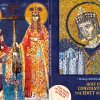Serbian History
Culture
Research Programs
- Jasenovac Research Institute - New York
- Hartford Institute for Religion Research - Research on Orthodox Christian Communities in the United States
Community
Organizations
- The North American Society for Serbian Studies (NASSS)
- The Association for Slavic, East European, and Eurasian Studies (ASEEES)
- Serbian Institute
- Harvard Club of Serbia
- Bridges to Serbia
- Njegoš Foundation
- The Harriman Institute
- RIZNICA Chamber Choir
Embassies and Consulates
- Embassy of the Republic of Serbia in the US
- Embassy of the Republic of Serbia in Canada
- Consulate General of Republic of Serbia in Chicago
- Consulate General of Republic of Serbia in New York
- Government of the Republic of Serbia, Ministry of Religion and Diaspora
Media
- Serbica Books
- Serb World U.S.A.




